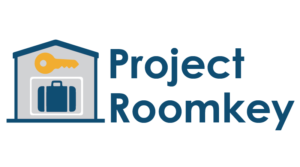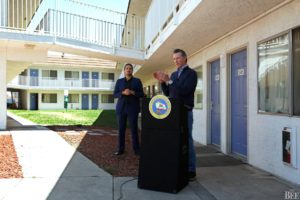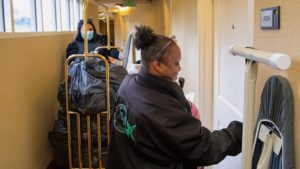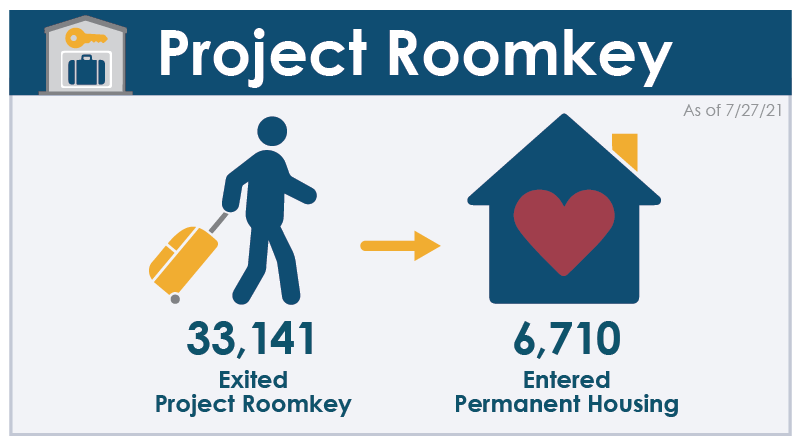 For nearly a year and a half, states across the country asked the public to stay at home to stop the community spread of COVID-19. For people experiencing homelessness, public health procedures designed to contain this contagious respiratory illness — self-isolation, social distancing, and handwashing — are nearly impossible. As a result, people experiencing homelessness are at increased risk of contracting COVID-19.
For nearly a year and a half, states across the country asked the public to stay at home to stop the community spread of COVID-19. For people experiencing homelessness, public health procedures designed to contain this contagious respiratory illness — self-isolation, social distancing, and handwashing — are nearly impossible. As a result, people experiencing homelessness are at increased risk of contracting COVID-19.
Rates of chronic conditions are significantly higher among people experiencing homelessness than in the general population, placing them at increased risk of becoming seriously ill from the virus. A March 2020 study (PDF) found that people experiencing homelessness who are infected by SARS-CoV-2, the virus that causes COVID-19, are potentially two to four times as likely to require critical care and two to three times as likely to die compared to the general population.
To combat this crisis, Governor Gavin Newsom initiated Project Roomkey, a first-in-the-nation effort to leverage Federal Emergency Management Agency (FEMA) funding to provide thousands of Californians experiencing homelessness with temporary housing. Project Roomkey is a coordinated effort between FEMA and state agencies including the California Governor’s Office of Emergency Services (Cal OES), Department of Social Services (DSS), and the Business, Consumer Services and Housing Agency (BCSH) to secure 15,000 rooms in hotels and motels throughout the state, and to get people experiencing homelessness into a space that allows for safe and supported isolation and quarantine.
PROJECT ROOMKEY: A YEAR AGO
 Project Roomkey is a groundbreaking program launched in March 2020 by Governor Gavin Newsom to get medically vulnerable people experiencing homelessness into safe, non-congregate shelters during the COVID-19 pandemic. Project Roomkey serves people experiencing homelessness who are COVID-19 positive or exposed, usually for up to 14-day stays, and individuals who are at higher risk for medical complications should they contract the virus, often for longer-term stays.
Project Roomkey is a groundbreaking program launched in March 2020 by Governor Gavin Newsom to get medically vulnerable people experiencing homelessness into safe, non-congregate shelters during the COVID-19 pandemic. Project Roomkey serves people experiencing homelessness who are COVID-19 positive or exposed, usually for up to 14-day stays, and individuals who are at higher risk for medical complications should they contract the virus, often for longer-term stays.
Project Roomkey has now helped over 42,000 people, and thousands of individuals are still being served across the state. Current occupancy data can be found on the data dashboard, which is updated weekly.
Not only does this program help provide places for people experiencing homelessness to safely shelter in place, but it also serves as a jumping-off point for permanent housing.
“We’re not just thinking short-term,” said Governor Newsom during an April 3 press conference outside a motel in Sacramento. “We’re also beginning to process an orientation of focus and energy around long-term supports, so that we can get people off the streets in a permanent way.”
PROJECT OUTCOMES
 Project Roomkey has been an instrumental part of California’s COVID-19 response and has proven a critical intervention to help people experiencing homelessness stabilize, access services, and move into permanent housing. A recent study of the efficacy of the Project Roomkey program in San Francisco concluded that 81 percent completed their recommended isolation/quarantine course, and only 4 percent of those transferred from the county hospital required readmission for COVID-19 progression. The evidence supporting the health benefits of Project Roomkey is clear – and so are the conclusions about the benefits to the people receiving these services, including access to mental and physical health care, increased feelings of stability and wellbeing, and higher exits to permanent housing due to increased engagement in housing services.
Project Roomkey has been an instrumental part of California’s COVID-19 response and has proven a critical intervention to help people experiencing homelessness stabilize, access services, and move into permanent housing. A recent study of the efficacy of the Project Roomkey program in San Francisco concluded that 81 percent completed their recommended isolation/quarantine course, and only 4 percent of those transferred from the county hospital required readmission for COVID-19 progression. The evidence supporting the health benefits of Project Roomkey is clear – and so are the conclusions about the benefits to the people receiving these services, including access to mental and physical health care, increased feelings of stability and wellbeing, and higher exits to permanent housing due to increased engagement in housing services.
 “Project Roomkey was a great success, protecting thousands of lives during the pandemic,” said California Department of Social Services Director Kim Johnson. “Now, many of these individuals are transitioning to more stable and secure housing up and down the state. However, there is much more to do. Working with our local partners, we will look to build on the success of Project Roomkey as we continue to combat homelessness in California.”
“Project Roomkey was a great success, protecting thousands of lives during the pandemic,” said California Department of Social Services Director Kim Johnson. “Now, many of these individuals are transitioning to more stable and secure housing up and down the state. However, there is much more to do. Working with our local partners, we will look to build on the success of Project Roomkey as we continue to combat homelessness in California.”
**Preliminary data from California counties and Tribal Governments show that 33,141 people have exited Project Roomkey, with 6,710 (20 percent) exiting to permanent housing.

LOOKING AHEAD
Governor Newsom’s May Revision includes historic investments to combat homelessness in California, including an additional $150 million for Project Roomkey to support the program’s ongoing operation and rehousing efforts. It also includes an expansion of the Homekey grant program to create additional opportunities for agencies to acquire hotels, motels, apartments, and other buildings to provide long-term homes for people experiencing or at risk of homelessness.
The California Department of Social Services continues to provide targeted technical assistance, including a new initiative with the Population Change Institute focused on rehousing technical assistance to connect Project Roomkey participants to stable and supportive housing upon exit.
For information for Project Roomkey/Homelessness Response providers during COVID, click here.
***UPDATE*** August 17, 2021: Governor Newsom Statement on Extended Federal Support for Local Governments Participating in Project Roomkey
###

